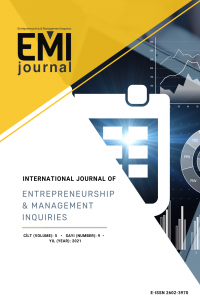Abstract
In the recent period post-truth gained a wide currency as a concept expressing the impossibility of separation true from false. The concept of post-truth emphasizes the disappearance of the relation between true and false that lasted through the centuries. In this sense, beside the fact that true and false cannot be distinguished from each other, the true also ceases to be more valuable than the false. Although the views that defended the inseparability of true and false have been put forward for a long time in social sciences and philosophy as individual views, today it has become as a main identifier of many disciplines and of the social life as a whole. This view gaining limited recognition in the previous periods has been a dominant element of the present world. In the present culture one of the main consequences of the development called as post-truth is excessive relativization. This situation makes it impossible to unite around one view in any issue. In parallel to this, the echo chamber that expresses the closedness to opposite and different views has been a dominant phenomenon of the present culture. As there have been an expectation that advanced communication technologies would increase plurivocality and diversity, the dominance of the echo chambers over the present culture is found surprising. However, it can be argued that the echo chambers are not a development contrary to plurivocality and diversity, but plurivocality and diversity are not determinant on their own. This is because, plurivocality and diversity become manifest as required by the techno-political structure in which they find a chance of existence and they are relocated. On the other hand, there is not a full consensus in each of the echo chambers. In a post-truth culture where excessive skepticism prevails, it can be claimed that the forms of power are determinant both in the level of interpersonal relations as well as in the macro level phenomena. Hence, on the basis of social relations or associations there are power structures rather than agreements or consensuss. The conventional definers of the communication process as negotiation, persuasion, acceptance, reconciliation, agreement, or divergence give their place to exposition to power structures in the post-truth age having a post-humanist character. In brief, in this study, within the frame of relevant literature it is emphasized that echo chamber is an ordinary part of the prevailing post-truth culture.
References
- Coşgun, M. (2021). Post-truth: hegemonya’nın yeni ideolojik aygıtı. Akademik Hassasiyetler, 8(15), 67-82.
- Forberg, P. L. (2021). From the Fringe to the Fore: An Algorithmic Ethnography of the Far-Right Conspiracy Theory Group QAnon. Journal of Contemporary Ethnography, 1-27.
- Fridlund, P. (2020). Post-truth Politics, Performatives and the Force. Jus Cogens, 2(3), 215-235.
- Fuller, S. (2020). A Player's Guide to the Post-Truth Condition: The Name of the Game. Anthem Press.
- Garrett, R. K. (2009). Echo chambers online?: Politically motivated selective exposure among Internet news users. Journal of computer-mediated communication, 14(2), 265-285.
- Hülür, H. & Yaşın, C. (2017). Yeni medya ve gazeteciliğin geleceğini çerçevelemek. H. Hülür & C. Yaşın (Ed.), Yeni medya: Geleceğin gazeteciliği (s. 9-39) içinde. Ankara: Ütopya Yayınevi.
- Inguyen, C. T. (2020). Echo chambers and epistemic bubbles. Cambridge University Press, 17(2), 141-161. Iyengar, S. & Massey, D.S. (2019). Scientific communication in a post-truth society. Proceedings of the National Academy of Sciences, 116(16), 7656-7661.
- Kitchens, B., Johnson, S. L., & Gray, P. (2020). Understanding echo chambers and filter bubbles: the ımpact of social media on diversification and partisan shifts in news consumption. MIS Quarterly, 44(4), 1619-1649.
- Kutlu, A. (2021). Myth or Fact? Echo Chambers in Online Political News Consumption. Electronic Turkish Studies, 16(2).
- Kutlu, A., & Doğan, E. (2020). Kesin bilgi, yayalım: Hakikat sonrası çağda yalan haberlere ilişkin Y kuşağının tutum ve davranışları. Akdeniz Üniversitesi İletişim Fakültesi Dergisi, (34), 83-101.
- Lapsley, D. & Chaloner, D. (2020). Post-truth and science identity: A virtue-based approach to science education. Educational Psychologist, 55(3), 132-143.
- Mackey, T. P. & Jacobson, T. E. ( 2019). Metaliterate learning for the post-truth world. American Library Association.
- Magee, B. ( 1990). Karl Popper’in bilim felsefesi ve siyaset kuramı (M. Tunçay, Çev.). İstanbul: Remzi Kitabevi.
- Medeni, T.D., Soylu, D., Andekina, R., & Medeni, İ.T. (2020). Abay-lnspired Refractive Amphoras Against Echo Chambers. Türk Kütüphaneciliği, 34(3), 536-547.
- McIntyre, L. (2018). Post-truth. Cambridge MA: MIT Press.
- Narin, B. (2018). Kişiselleştirilmiş çevrimiçi haber akışının yankı odası etkisi, filtre balonu ve siberbalkanizasyon kavramları çerçevesinde incelenmesi. Selçuk İletişim, 11(2), 232-251.
- Osterbur, M. & Kiel, C. (2021). Tweeting in echo chambers? Analyzing Twitter discourse between American Jewish interest groups. Journal of Information Technology & Politics, 18(2), 194-213.
- Sasahara, K., Chen, W., Peng, H., Ciampaglia, G. L., Flammini, A., & Menczer, F. (2021). Social influence and unfollowing accelerate the emergence of echo chambers. Journal of Computational Social Science, 4(1), 381-402.
- Sharot, T. (2017). The influential mind: What the brain reveals about our power to change others. New York: Henry Holt and Company.
- Visvizi, A. & Lytras, M. D. (2019). Politics and ICT: Issues, challenges, developments. (A.Visvizi & M. D. Lytras (Ed.), Politics and technology in the post-truth era. Bingley: Emerald Publishing.
- Yazıcı, Ç. (2021). Hakikat-Sonrası ve Yalnızlık. Kaygı. Bursa Uludağ Üniversitesi Fen-Edebiyat Fakültesi Felsefe Dergisi, 20(1), 264-279.
Abstract
Son dönemde doğruluk-sonrası, doğruyu yanlıştan ayırmanın mümkün olmadığını ifade eden bir kavram olarak yaygınlık kazanmıştır. Doğruluk-sonrası kavramı, doğru ile yanlış arasında çağlar boyunca geçerli olan ilişkinin ortadan kalktığını vurgulamaktadır. Bu açıdan, doğru ile yanlış birbirinden ayırt edilemez hale geldiği gibi doğru yanlıştan daha değerli olmaktan da çıkmıştır. Doğru ile yanlışın birbirinden ayırt edilemez olduğunu savunan görüşler sosyal bilimlerde ve felsefede uzun zamandan beri bireysel görüşler olarak ileri sürülmesine rağmen günümüzde pek çok disiplinin ve genel olarak toplumsal yaşamın temel bir tanımlayıcı boyutu haline gelmiştir. Önceleri sınırlı bir kabul gören bu görüş günümüz dünyasının başat bir öğesi olmuştur. Günümüz kültüründe doğruluk-sonrası olarak adlandırılan gelişmenin temel sonuçlarından biri de aşırı görecelileşmedir. Bu durum herhangi bir konuda tek bir görüş etrafında toplanmayı imkansızlaştırmaktadır. Buna koşut olarak karşıt ve farklı görüşlere kapalılığı ifade eden yankı odası günümüzdeki iletişim kültürünün hâkim bir olgusu haline gelmiştir. Gelişmiş iletişim teknolojilerinin çok sesliliği ve çeşitliliği artıracağına yönelik bir beklenti olduğu için yankı odalarının günümüz kültürüne hakimiyeti şaşırtıcı bulunmaktadır. Buna karşın, yankı odalarının çok sesliğin ve çeşitliliğin aksine bir gelişme olmadığı, ancak çok sesliliğin ve çeşitliliğin kendi başlarına belirleyici olmadıkları söylenebilir. Çünkü çok seslilik ve çeşitlilik, içinde varolma imkânı buldukları ve taşındıkları tekno-politik yapının bir gereği olarak tezahür etmektedir. Diğer yandan, yankı odalarının her birinde tam anlamıyla fikir birliği olduğundan bile söz edilemez. Aşırı kuşkuculuğun geçerli olduğu doğruluk-sonrası bir kültürde kişiler arası ilişkiler düzeyinde olduğu gibi makro olgular düzeyinde de iktidar biçimlerinin belirleyici olduğu söylenebilir. Dolayısıyla, toplumsal ilişkilerin veya birlikteliklerin temelinde görüş birliği veya anlaşma değil iktidar yapıları bulunmaktadır. Tartışma, ikna etme, kabul etme, uzlaşma, anlaşma gibi iletişim sürecinin konvansiyonel tanımlayıcıları, post-hümanist bir karakter taşıyan doğruluk-sonrası çağda yerini iktidar yapılarına maruz kalmaya bırakmaktadır. Özetle, bu çalışmada, ilgili alanyazın temelinde yankı odasının, günümüzde hâkim olan doğruluk-sonrası kültürün olağan bir parçası olarak ortaya çıktığı vurgulanmaktadır.
References
- Coşgun, M. (2021). Post-truth: hegemonya’nın yeni ideolojik aygıtı. Akademik Hassasiyetler, 8(15), 67-82.
- Forberg, P. L. (2021). From the Fringe to the Fore: An Algorithmic Ethnography of the Far-Right Conspiracy Theory Group QAnon. Journal of Contemporary Ethnography, 1-27.
- Fridlund, P. (2020). Post-truth Politics, Performatives and the Force. Jus Cogens, 2(3), 215-235.
- Fuller, S. (2020). A Player's Guide to the Post-Truth Condition: The Name of the Game. Anthem Press.
- Garrett, R. K. (2009). Echo chambers online?: Politically motivated selective exposure among Internet news users. Journal of computer-mediated communication, 14(2), 265-285.
- Hülür, H. & Yaşın, C. (2017). Yeni medya ve gazeteciliğin geleceğini çerçevelemek. H. Hülür & C. Yaşın (Ed.), Yeni medya: Geleceğin gazeteciliği (s. 9-39) içinde. Ankara: Ütopya Yayınevi.
- Inguyen, C. T. (2020). Echo chambers and epistemic bubbles. Cambridge University Press, 17(2), 141-161. Iyengar, S. & Massey, D.S. (2019). Scientific communication in a post-truth society. Proceedings of the National Academy of Sciences, 116(16), 7656-7661.
- Kitchens, B., Johnson, S. L., & Gray, P. (2020). Understanding echo chambers and filter bubbles: the ımpact of social media on diversification and partisan shifts in news consumption. MIS Quarterly, 44(4), 1619-1649.
- Kutlu, A. (2021). Myth or Fact? Echo Chambers in Online Political News Consumption. Electronic Turkish Studies, 16(2).
- Kutlu, A., & Doğan, E. (2020). Kesin bilgi, yayalım: Hakikat sonrası çağda yalan haberlere ilişkin Y kuşağının tutum ve davranışları. Akdeniz Üniversitesi İletişim Fakültesi Dergisi, (34), 83-101.
- Lapsley, D. & Chaloner, D. (2020). Post-truth and science identity: A virtue-based approach to science education. Educational Psychologist, 55(3), 132-143.
- Mackey, T. P. & Jacobson, T. E. ( 2019). Metaliterate learning for the post-truth world. American Library Association.
- Magee, B. ( 1990). Karl Popper’in bilim felsefesi ve siyaset kuramı (M. Tunçay, Çev.). İstanbul: Remzi Kitabevi.
- Medeni, T.D., Soylu, D., Andekina, R., & Medeni, İ.T. (2020). Abay-lnspired Refractive Amphoras Against Echo Chambers. Türk Kütüphaneciliği, 34(3), 536-547.
- McIntyre, L. (2018). Post-truth. Cambridge MA: MIT Press.
- Narin, B. (2018). Kişiselleştirilmiş çevrimiçi haber akışının yankı odası etkisi, filtre balonu ve siberbalkanizasyon kavramları çerçevesinde incelenmesi. Selçuk İletişim, 11(2), 232-251.
- Osterbur, M. & Kiel, C. (2021). Tweeting in echo chambers? Analyzing Twitter discourse between American Jewish interest groups. Journal of Information Technology & Politics, 18(2), 194-213.
- Sasahara, K., Chen, W., Peng, H., Ciampaglia, G. L., Flammini, A., & Menczer, F. (2021). Social influence and unfollowing accelerate the emergence of echo chambers. Journal of Computational Social Science, 4(1), 381-402.
- Sharot, T. (2017). The influential mind: What the brain reveals about our power to change others. New York: Henry Holt and Company.
- Visvizi, A. & Lytras, M. D. (2019). Politics and ICT: Issues, challenges, developments. (A.Visvizi & M. D. Lytras (Ed.), Politics and technology in the post-truth era. Bingley: Emerald Publishing.
- Yazıcı, Ç. (2021). Hakikat-Sonrası ve Yalnızlık. Kaygı. Bursa Uludağ Üniversitesi Fen-Edebiyat Fakültesi Felsefe Dergisi, 20(1), 264-279.
Details
| Primary Language | Turkish |
|---|---|
| Subjects | Studies on Education |
| Journal Section | Articles |
| Authors | |
| Publication Date | December 30, 2021 |
| Submission Date | October 11, 2021 |
| Acceptance Date | December 3, 2021 |
| Published in Issue | Year 2021 Volume: 5 Issue: 9 |



Journal EMI e-mail Adresi: internationaljournalemi@gmail.com
JOURNAL EMI Creative Commons Attribution 4.0 Uluslararası Lisansı ile lisanslanmıştır.


